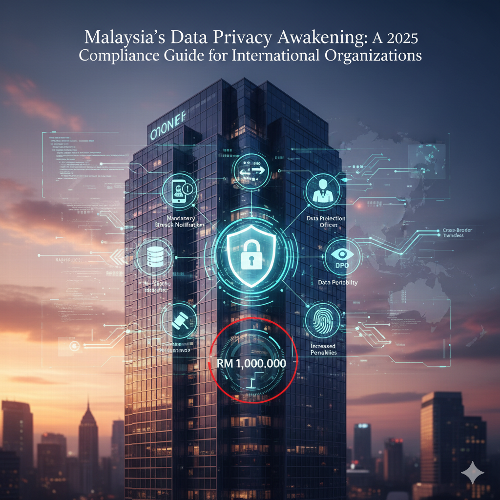The grace period is over. From mandatory DPOs to direct vendor liability, here is how Malaysia's modernized regulatory landscape impacts your cross-border operations.
Date: November 2025
For over a decade, Malaysia's Personal Data Protection Act 2010 (PDPA) was viewed by many international observers as a "soft touch" regime—functional, but lacking the teeth and specificity of the GDPR or Singapore's PDPA.
That era has officially ended.
Following the full implementation of the PDPA Amendment Act 2024 in June 2025, Malaysia has aligned itself with global data protection standards. For international organizations operating in Kuala Lumpur or processing Malaysian data offshore, the regulatory risk profile has shifted significantly.
If your regional compliance strategy hasn't been updated in the last six months, you are likely non-compliant. Here is the executive summary of the new normal in Malaysia.
1. The Breach Notification Mandate
For years, Malaysia had no mandatory data breach notification requirement. Companies could theoretically suffer a breach and keep it quiet.
As of mid-2025, this is illegal. You are now required to notify the Personal Data Protection Commissioner (PDPC) of any data breach "as soon as practicable." Furthermore, if the breach poses a risk of significant harm to individuals (e.g., financial fraud, identity theft), you must notify the affected data subjects directly.
The Impact: Global organizations must integrate Malaysia into their global incident response protocols. A breach in your Malaysian subsidiary can no longer be handled purely internally; it requires a regulatory touchpoint.
2. Vendor Management: The "Processor" Shift
Historically, the PDPA only penalized the "Data User" (Controller). If your third-party cloud provider or payroll vendor caused a leak, the liability sat largely with you.
The amended Act introduces direct liability for Data Processors. Your vendors in Malaysia can now be fined and prosecuted directly for security failures.
The Impact: While this reduces some burden on the Controller, it complicates vendor relationships. International organizations must review all service agreements to ensure vendors are aware of their new statutory obligations. Expect pushback on liability clauses during contract renewals.
3. Cross-Border Transfers: The "Whitelist" is Dead
For international businesses, the old Section 129 was a headache. It theoretically forbade transferring data out of Malaysia unless the destination country was on a government-gazetted "Whitelist"—a list that, notoriously, was never populated.
The 2024 Amendment abolished the whitelist regime. The new rule allows transfers if:
The destination country has "substantially similar" data protection laws; OR
You have a contract (or binding corporate rules) ensuring an adequate level of protection.
The Impact: This facilitates smoother data flows to regional hubs like Singapore, Japan, or the EU. However, it places the burden of proof on the organization to demonstrate that "adequate protection" exists via contract.
4. The Mandatory Data Protection Officer (DPO)
Appointment of a DPO is no longer optional for organizations processing data on a significant scale or handling sensitive data.
The Impact: Many MNCs designate a "Regional DPO" based in Singapore or Hong Kong. Under the new Malaysian rules, you must ensure this individual (or a local representative) is registered with the PDPC and accessible to Malaysian authorities. If you haven't registered a specific individual as your Malaysian DPO, you are currently in violation.
5. New Fines and Imprisonment
The cost of non-compliance has tripled. The maximum fine for breaching data principles has been raised from RM 300,000 to RM 1,000,000 (approx. USD 230,000), and potential imprisonment terms have been extended to three years. While these figures are lower than GDPR percentages, the threat of criminal liability for directors remains a potent enforcement tool in the Malaysian legal system.
Beyond the PDPA: The Wider Digital Ecosystem
International investors must also note that the PDPA does not exist in a vacuum.
The Cyber Security Act 2024: If your organization is designated as "National Critical Information Infrastructure" (e.g., Banking, Energy, Healthcare, Transport), you face strict mandatory audit and reporting standards separate from the PDPA.
The Data Sharing Act 2024: Passed in late 2024, this regulates public sector data. If your organization partners with the Malaysian government (B2G), this law dictates how your data interacts with public repositories.
Common Questions from International HQ
Q: We already comply with GDPR. Does this mean we are automatically compliant with the Malaysian PDPA 2024 Amendments?
A: Not entirely. While the 2024 amendments move Malaysia closer to GDPR standards (e.g., adding Data Portability and DPOs), differences remain. Notably, Malaysia's "White List" regime for data transfers has been replaced but requires specific contractual assurances different from EU SCCs. Additionally, the definitions of "sensitive data" in Malaysia now explicitly include biometric data, which requires specific handling. You cannot simply "copy-paste" your GDPR policy; local nuances regarding the Personal Data Protection Commissioner's specific reporting flows must be integrated.
Q: Can our Regional Data Privacy Officer in Singapore serve as the DPO for our Malaysian entity?
A: Yes, but with conditions. The law allows for the appointment of a DPO, and while they do not necessarily need to be physically permanently resident in the office, they must be accessible to the Commissioner and the data subjects in Malaysia. If you utilize a regional DPO, you must ensure they are officially registered as the DPO for the Malaysian entity with the PDPC and can respond to local regulatory inquiries promptly (often requiring a local representative or robust communication channels).
Q: Our data is stored on a cloud server in the US. Do we need to move it back to Malaysia?
A: No. The 2024 Amendment has liberalized cross-border data transfers. The strict requirement for a government-gazetted "White List" has been replaced. You may transfer data offshore provided the destination has "substantially similar" laws, or—more commonly for MNCs—if you have a contract in place with the recipient (e.g., your cloud provider or HQ) that ensures the data remains protected to Malaysian standards. Inter-company transfer agreements are now your primary tool for compliance here.
Q: If our third-party payroll vendor causes a leak, are we still liable?
A: Yes, but they are now liable too. Under the 2010 Act, the Data User (Controller) bore the brunt of the liability. The 2024 Act introduces direct liability for Data Processors. If your vendor is negligent, the PDPC can fine them directly. However, as the Data User, you retain the responsibility to select compliant vendors and maintain contractual oversight. You will not be "off the hook," but your vendor now has "skin in the game."
Q: Is there a strict "72-hour" rule for reporting breaches like in the EU?
A: The Malaysian statute uses the phrasing "as soon as practicable." While this offers some flexibility compared to the GDPR's strict 72-hour countdown, the PDPC's guidelines and enforcement precedents suggest that any delay beyond 72 hours without valid justification is likely to be viewed as non-compliance. We strongly advise internal protocols to mirror the 72-hour standard to be safe.
Action Plan for Regional Compliance Heads
To ensure resilience against this new legislative backdrop, international organizations should immediately:
- Audit the "Local" DPO: Ensure your appointed DPO is officially registered with the Malaysian PDPC.
- Update Data Transfer Agreements: Replace any reliance on the old "whitelist" logic with robust Inter-Company Agreements or Standard Contractual Clauses (SCCs) that satisfy the new "adequate protection" requirement.
- Review Processor Contracts: Send notices to your Malaysian vendors regarding their new direct statutory liabilities.
- Run a Breach Simulation: Test your incident response plan. Can your local Malaysian team escalate a breach to the PDPC within a 72-hour window?
Conclusion
Malaysia has shed its legacy data laws for a modern, accountability-based framework. For international organizations, this is a positive development that simplifies cross-border harmonization—but only if your local compliance posture catches up to the new reality.
For a free consultation click here

